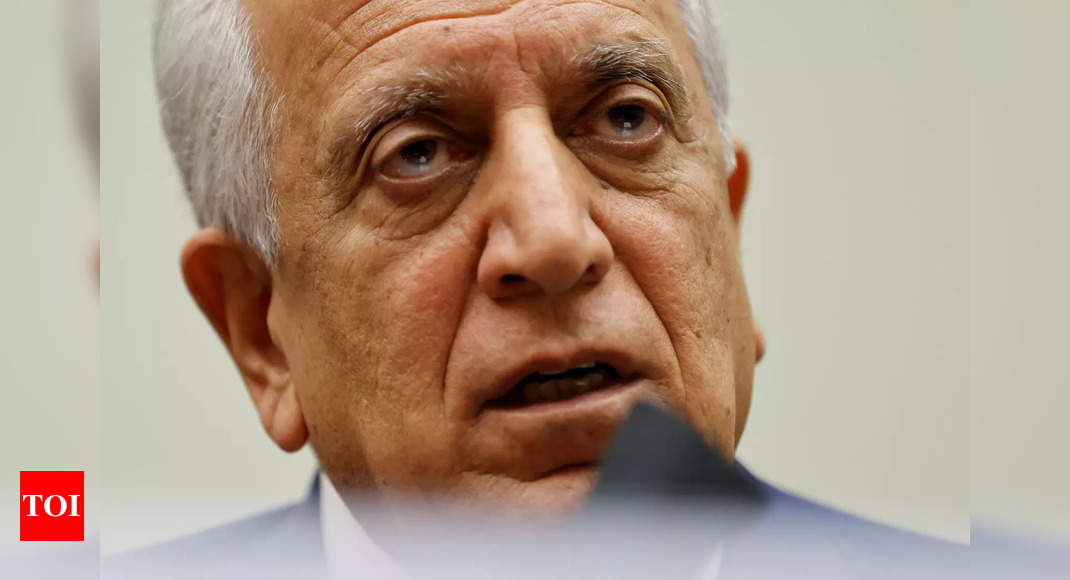khalilzad: Spotlight for crisis in Afghanistan must fall on Zalmay Khalilzad – Times of India
[ad_1]
Khalilzad was assigned by the Trump administration to seal a peace deal between the elected Afghan government and the Taliban, as a natural choice with him being born in Afghanistan as an ethnic Pashtun who was well aware of the fault lines of the Afghan culture, reported Interzine.
The two tasks that he was assigned were to secure a peace deal with the Taliban and to ensure the orderly withdrawal of the US troops from the country.
Considered chameleon in diplomacy, Khalilzad has adopted the US administrations he has served under at any given time, therefore adapting to the circumstances which have often led to inconsistencies in his policy recommendations for Afghanistan, according to the online magazine.
Despite such inconsistencies, there has been no public scrutiny of his long history in Afghanistan and what is the reason behind the Afghans considering him problematic.
The complication deepened on February 29, 2020, as Khalilzad signed a peace deal with Taliban co-founder Mullah Baradar in Doha which provided for the gradual withdrawal of the US and the NATO troops. The Taliban had assured to adhere to a complete ceasefire besides not allowing the Afghan soil to be used for terrorism and ending its ties with Al-Qaeda.
However, the Taliban has expectedly violated the terms of the agreement which obsequiously disparaged their relations with Al-Qaeda and both groups continued to cooperate, reported Interzine citing a United Nations report.
One controversial and consequential aspect included the Taliban’s demand that the Afghan government release hundreds of Taliban prisoners, courtesy of Khalilzad who, while acknowledging it was a difficult decision, also stated it was necessary for the “desirability of peace.” The Taliban once again expectedly defied the Doha deal and the freed Taliban members got back to the battlefield.
“Based on recent conversations with Afghans, including the various Taliban factions, and Pakistanis, I am confident that they would welcome an American reengagement. The Taliban does not practice the anti-US style of fundamentalism. The departure of Osama bin Laden, the Saudi financier of various anti-US terrorist groups, from Afghanistan indicates some common interest between the United States and the Taliban,” the magazine quoted Khalilzad’s op-ed as saying.
These comments were not made in recent years, but as far back as October 1996. Soon after, the Taliban asserted their authority in Afghanistan with medieval brutality. Osama bin Laden and his al-Qaeda cohort were provided support and sanctuary by the Taliban, enabling them to establish a terrorist infrastructure that, contrary to Khalilzad’s assumptions, showed the Taliban had no desire to engage meaningfully with the US, it stated.
Just a year before 9/11, Khalilzad asserted the need for the confrontation with the Taliban, a “rogue regime” to prevent them from consolidating power.
Khalilzad became the most influential person in Afghanistan after serving as the Special Assistant to President George W Bush. He oversaw the 2001 Bonn Conference in Germany as part of a roadmap for post-Taliban Afghanistan preparing the basis of the crisis the country is facing today.
He was made the US Ambassador to Afghanistan. There were reports that Khalilzad was even considering running for Afghan president.
Soon after President Joe Biden announced the date for the withdrawal of the US troops from Afghanistan, Khalilzad resorted to expressing optimism for the future of the country under the Taliban.
“The Taliban know that they need to be accepted as part of the future of Afghanistan, not to be a pariah,” the magazine quoted Khalilzad as saying.
Effectively, Khalilzad ended up supporting the Taliban as they took Kabul and Ghani fled the country, leaving no chance of a power-sharing arrangement, according to the magazine.
[ad_2]
Source link


Comments are closed.